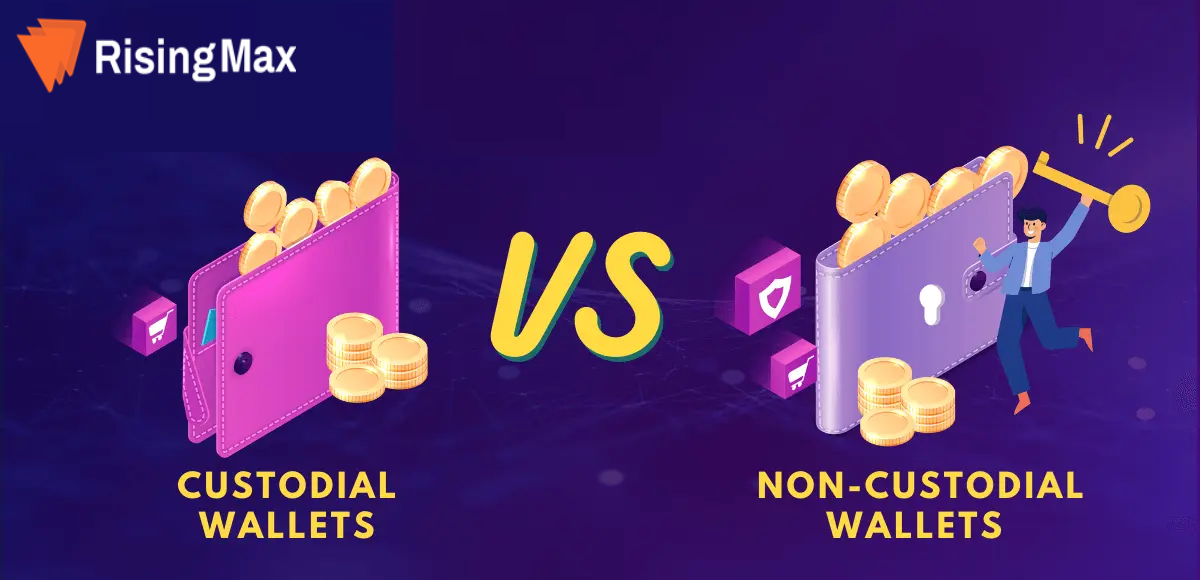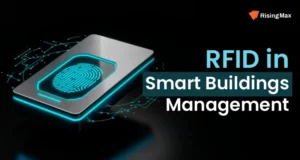Cryptocurrency is digital money, and has gained immense popularity in recent years. Investing in cryptocurrency involves making a lot of challenging choices. After considering which asset to purchase, you must store the digital asset in a secure place.
The digital asset industry values security, as even the most competent platforms and individuals have previously failed to protect the funds from theft, fraud, or accidental loss.
The features of a crypto wallet can make the difference between keeping and losing money in specific scenarios, making it an essential part of crypto security.
After buying cryptocurrency, deciding between a custodial and non-custodial wallet is important.
But how to know whether to choose custodial wallet or non-custodial wallet?

When you use a non-custodial wallet, you have complete control over your private keys, which are associated with your cryptocurrency and serve as proof of ownership. A non-custodial wallet eliminates the need to rely on a third party, but it also requires you to ensure you do not misplace your keys and take all necessary measures to safeguard your funds.
On the other hand, when you use a custodial wallet, a third party manages your private keys. This means you are entrusting a third party to safeguard your digital asset and subsequently give it back to you when you are prepared to trade or transfer it. Using a custodial wallet allows you to avoid taking full ownership of your cryptocurrency, but you must have faith in the cryptocurrency exchange that acts as the custodian.
Nowadays, people typically use web-based exchange wallets for custodial storage.
Let us uncover some basics facts before knowing the difference between custodial & non custodial crypto wallets.
What are Cryptocurrency Wallets?
In custodial wallets, the centralized authority or third party has full control over the private keys and crypto funds, although your permission is required for sending/receiving the cryptocurrencies. The custodial wallets relieve the users of the responsibility to safeguard digital assets. The most famous custodial wallet these days is Coinbase.
The following are the key features of custodial wallets:
Third-party management: When we use a custodial wallet, a service provider takes care of the technical parts of keeping our digital assets safe.
Convenience: Beginners find custodial wallets great because they are simple to use and install.
Added features: Custodial wallets enhance functionality by offering extra features that allow users to buy, sell, and exchange cryptocurrencies directly on the platform.
Trust and risks: Using a custodial wallet requires trusting the service provider to secure your assets. If the service gets hacked, declares bankruptcy, or limits your account access, your money may be in jeopardy.
Personal information: When using custodial wallets, you may need to disclose personally identifiable information (such as identification) to comply with regulations.
Custodial wallets have an additional advantage for the newbies as they don’t have to operate them alone. So, anybody with no advanced technical knowledge can go ahead with the custodial wallet options for cryptocurrency trading.
On the other hand, the custodial wallets bring some challenges, like suddenly locking users out of the wallet. This way, users will lose control over all of their digital money.
If you want to rely on a custodial wallet, you must look for a reliable service provider and explore various facts like types of services, where and how private keys are stored, insurance coverage, etc.
Examples of Custodial Wallets
- Cobo wallet
- Freewallet
- Bakkt
- BitGo
- Venly Wallet

Looking for The Team to Build a Brand New Blockchain App?
We design and develop complex web and mobile apps, that bring value to customers, and change the way people think and act. Check out our portfolio to make sure we are a good fit for you.
Pros & Cons Of Custodial Wallets
Following are the pros and cons of considering the custodial wallet:
| Pros Of Custodial Wallets | Cons Of Custodial Wallets |
|---|---|
| Fast and Free Transactions: Custodial wallets charge no transaction fee, unlike the other wallets. The custodial wallet ecosystem allows the users to execute transactions completely free of cost. This way, customers can save a considerable amount of money yearly while making transactions. | Full Third-Party Control: When you start with a custodial wallet, you lose all your control over the digital money and the private keys. Every transactional process is under the supervision of the custodial party. They can perform operations on your funds and freeze the amount contained in the wallet. |
| Excellent UI/UX: Custodial wallets offer a high user experience for the user interface. The experts and the newbies can easily navigate through the wallet. Customers can find what they look for smoothly and systematically. | KYC Required: The custodial wallets strictly recommend that users do KYC to access their funds and assets. You need to provide the documentation to verify your identity to start crypto transactions. When you need to prove your identity, it breaks the concept of anonymity. |
| High Backup Chances: We have already stated that a third party manages your funds and private keys. The exchange authority is also responsible for managing the backup facilities. So, It is quite easy to restore or undo any transaction with the help of a third party. | Only Online Facility: The custodial wallets are not available offline; an internet connection is a basic requirement to operate the custodial crypto wallets from anywhere. So, this can be challenging for custodial wallet users if they need to access their wallets in an emergency. |
| Private Keys Regain Access: If the user loses the private keys, there will not be an issue as the exchange authority will help to regain access to the private keys. Custodial wallet users face authority issues as everything is controlled at the end of a third party. | Data Breaching Possible: In custodial wallets, the funds are stored in cold and hot wallets. Though hacking these wallets is not easy, they are prone to data breaching threats. For example, in 2014, the hackers successfully hacked almost 7-0% of the transaction, causing a loss of $450M. |
What Are Non-Custodial Wallets?
A non-custodial or self-custodial wallet gives you full control over your web3 based crypto wallet and assets. You have full control over your public and private keys.
Non-custodial wallets, unlike custodial wallets, allow the owner to retain full control of the keys instead of entrusting them to a third party, like an exchange. When you use a non-custodial wallet, you are solely responsible for the security of your private keys and the wallet itself.
A non-custodial wallet resists censorship because the owner controls its access rather than the host platform controlling it, like in custodial wallets. This independence from third parties allows the owner to protect their assets from seizure by directly accessing their blockchain address.
Types of Non-Custodial Wallets
There are generally three kinds of non-custodial wallets.
Software Non-Custodial Wallets: You can use a software non-custodial wallet app on your computer, mobile phone, or web portal to store and access digital assets. The software wallet’s interface safely stores your private keys, which are always linked to the internet. Storing the private keys in these wallets online allows easy access and exposes them to digital hacks. Wallets like Trust Wallet and Metamask offer software non-custodial wallets.
Hardware Wallets: Hardware wallets are the cryptographic wallets that keep your private keys offline in a safe physical device not connected to the internet. You need hardware to access your cryptocurrency holdings, which is usually a small device you can plug into your computer. Examples of hardware wallets include the Stax, Nano X, and Nano S Plus.
Paper Wallets: Using a paper wallet, you can also store your private keys offline. You printed the document on paper, including your private keys and QR codes. To access your assets in the software wallet, you need a different cryptocurrency wallet app that can read the QR code. The most secure option is to keep your cryptocurrency in a paper wallet, completely disconnected from the internet. However, paper’s inferior durability as a storage medium makes them less common.
Examples of Non-Custodial Wallets
- MetaMask
- Exodus
- Coinbase Wallet
- Trust Wallet
- Ledger Nano S Plus
Pros & Cons of Non-Custodial Wallets
Non-custodial wallets offer you an amazing set of advantages and disadvantages as well, which are listed below:
| Pros of Non-Custodial Wallets | Cons of Non-Custodial Wallets |
|---|---|
| Full Control in Non Custodial Wallets:More and more people have started investing in crypto and don’t appreciate the control of a third party over their assets. And with a non-custodial wallet, the users get the best experience with the full authority of the funds and private keys. | Sense of Responsibility:All is the user’s responsibility, from storing to keeping the keys in a safe place. A little mistake can lead to a bigger financial loss. Robbery can happen anywhere, whether you hold the private keys in a hardware wallet or a desktop. |
| No Data Exposure Risk:No intermediary means your details and identity is not revealed to anybody. So, there is no risk of data exposure involved, including the funds and details. | Bad UI/UX:Custodial wallets are not the best when offering a high-quality user interface experience. Users may experience difficulty in navigating the wallet. |
| Quick Withdraws:The custodial wallets streamline the process to withdraw the assets. The process is fast as there is no role of the third party in executing the transactions. | >b>Keys Loss is Money Loss:Private keys are the only way to restore your wallet if you need them. If you lose your private key, there is no way to regain access. You can be logged out of your wallet, causing a financial disaster. |

Custodial vs Non-Custodial Wallet – Choose The Right One
Before selecting a crypto wallet, we should carefully evaluate our needs and priorities. Remember the characteristics of both custodial and non-custodial crypto wallets:
Convenience vs control: Non-custodial wallets offer more control and security, while custodial wallets offer ease of use and convenience.
Security and privacy: Non-custodial wallets prioritize security and privacy.
Technical proficiency: To use non-custodial wallets efficiently, you must have more knowledge.
| Features | Custodial Wallet | Non-Custodial Wallet |
| Private Key | Third-party Ownership | Wallet Holder Ownership |
| Accessibility | Registered Accounts | Accessible To Anyone |
| Transaction Costs | Typically Higher | Typically Lower |
| Security | Typically Lower | Typically Higher |
| Support | Typically Higher | Typically Lower |
| KYC Requirements | Yes | No |
| Convenience | User friendly and easier to set | Require technical knowledge to set up |
| Personal Information | May require personal information | No personal information is required |
| Recovery | Recovery options available | Private key loss will result in permanent funds loss |
By learning about custodial and non-custodial wallets, we can make a well-informed decision and keep your cryptocurrency safe.
Here are some other key difference about custodial wallet and non-custodial wallet you need to know before making a decision.
Account Creation
How easily you can create your wallet account matters a lot. The ease of creating an account is important to offer the best user experience. When you sign up for a custodial wallet, KYC and AML procedure is mandatory to offer robust security.
Still, at the same time, you have to be patient to get your account created, as it is a time-consuming process. On the other hand, non-custodial wallets take less time for account creation and keep the user anonymous.
Access To Funds
The one key factor that differentiates both is fund accessibility. With a custodial wallet, every detail about your funds and your private keys is accessible by a third party. With a non-custodial wallet, you have complete authority on funds and keys. Few risks are associated when you hand over the responsibility of your assets to somebody else.
However, if you want to stay free from safeguarding your assets, then custodial wallets are best for you. And they better know how to restore and back up your data if required.
Security
Security is the prime factor when someone signs up for the best crypto wallet. Custodial wallets are secure and safe to store your assets as they have strong and unique authentication procedures. But, these crypto wallets need a strong internet connection. On the other hand, your keys are kept confidential in custodial wallets, so there is no risk of any unauthorized access.
Which Crypto Wallet Should You Choose to Store Your Digital Assets?
The crypto wallets are perfect for storing your assets depending on different conditions and as per your needs. Investors and traders should ensure that the wallet supports the type of cryptocurrency they want to store and trade. And the wallets get updated from time to time to meet the users’ needs. Both wallet options have benefits and drawbacks. If you want a wallet that offers both ease of use and a reliable backup recovery option, choose a custodial wallet. Choose a non-custodial wallet if you want full ownership of your private keys and total control over your cryptocurrency.
FAQs About Custodial vs Non-Custodial Crypto Wallets
What is the Difference Between Custodial and Non-custodial Cryptocurrency Services?
Users manage their own private keys in non-custodial cryptocurrency services, but third parties handle them in custodial services. The main difference between the two is this.
How Custodial Wallet Works?














